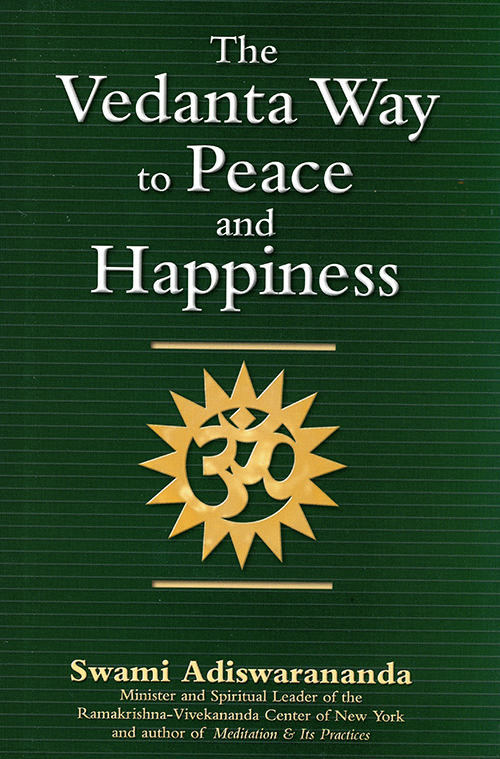
The Vedanta Way to Peace and Happiness
Swami Adiswarananda This practical volume examines many of the common obstacles to spiritual fulfillment-such as questions about human suffering, death, doubt of God's existence and many others.
Using language that is accessible to people of all faiths and back-grounds, this book introduces you to the time-tested teachings of Vedanta-potential divinity of the soul, unity of all existence, oneness with the Divine, and harmony of religions-to overcome the problems of life.
Hardcover $24.99
The Vedanta Way to Peace and Happiness
Swami Adiswarananda
Introduction
Vedanta is the wisdom of the Vedic sages. For thousands of years it has inspired people to find solutions to the problems of life and thus reach the highest fulfillment. As a philosophy of living, Vedanta has been tested and verified in the lives of countless seekers, saints, and prophets of India. The Vedanta way is decisive and its practices are based upon science and reason.
For centuries the Vedanta philosophy was kept carefully guarded by saints and ascetics living in forests and mountains, and never made public. They thought that the teachings would be diluted and misunderstood by the masses, who were prone to believe not in truth but in myths and miracles. In matters of spirituality and religion, truth is often sacrificed to fiction and make-believe. A rational and realistic approach is rare. Religious texts are filled with eulogy, exaggeration, doubtful myths and loving legends. The average person regards scriptures as infallible, forgetting that the scriptures are in fact remembered words and experiences written down by human beings.
Swami Vivekananda was the first to bring the teachings of Vedanta from the forest to the general public. He thought that because of the developments of science the time had come to deliver the message of Vedanta to all. According to the Swami, the teachings of Vedanta are worth nothing if they are not problem-solving. They are useless unless they enrich our lives and lead us to peace and happiness.
Vedanta reminds us that the course of life is mysterious. It is plagued by ceaseless changes and uncertainties. Pain, suffering, illness, old age and death are harsh realities that cannot be ignored or avoided. Vedanta maintains that problems and solutions go together; one cannot exist without the other. If nature presents a problem, it also points toward a solution. In suggesting solutions Vedanta does not deal with the occult or miraculous and does not cater to fads, whims or pious imaginations. According to Vedanta, our happiness depends upon peace of mind, peace of mind on self-control, and self-control on awareness of our true Self.
The present book does not compromise the orthodox views of Vedanta. It deals with such subjects as life and its meaning, mastering the restless mind, the spiritual quest, the practice of meditation, the controversy between faith and reason, and facing the problems of life. Vedanta assures us that we are not living in the final days of our destiny, that every problem has a solution, and that the human soul is not a prisoner of karma or sin. The merciless and inexorable laws of life can be countered and overcome. The book presents both the facts and fictions of human life and assures us that, regardless of background, culture, training, or religious belief, all can follow the Vedanta way to resolve the problems of life and reach the supreme goal.
Competent editors have gone through this book, and I am grateful to them for their valuable contributions. It is my fervent hope that this book will be of help to the readers in their quest for peace, happiness, and spiritual fulfillment.



